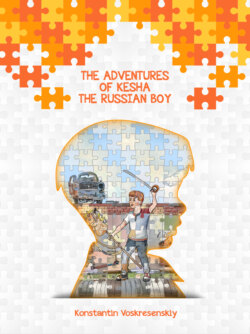Читать книгу The Adventures of Kesha the Russian Boy - Константин Воскресенский - Страница 3
Chapter 1. 1985. The Beginning
Оглавление1985. Kesha
Let's start with the boy's name in the title of the book.
You must agree that naming a child is a fascinating but difficult task. Many parents will confirm this. In our day, my wife and I also faced this task. We cheated a little, naming our child after the saint of the month she was born. This practice in the Eastern Orthodox Church and Eastern Catholic Churches that follow the Byzantine Rite.
My mum decided to call me Innokenty, or Innocentius in its Latin form. I lived with that name for almost two weeks. Later it turned out that not everyone liked it, which she discovered when my aunt Nadia came to the baby shower. At the time, she was still at primary school. When they told her what I was called, she said, «Oh, I know, he should be called Kesha! I watched a cartoon yesterday about a parrot called Kesha…» My granny Marina lost her patience and emphatically stated that no grandson of hers would be called Innocentius. The boys would tease him at school!
But if this was no longer his name, then what was? They decided to write three names write on three pieces of paper – Ilya, Roman and Konstantin – and mum picked them out of a hat. Lo and behold, I became Konstantin.
To be honest, I would have been satisfied with the first name, but the one I ended up with is much more normal…
1986. My father's death
But changing names is just for starters. More significant events were just around the corner. When I was one year and five days old, I found myself without a father. My dad, Dmitriy Voskresenskiy, was killed while serving in the military at the (tender) age of 19.
You may not be familiar with how they recruited for the Soviet Army. Long story short, the USSR conscripted young men from the age of 18. Back then, they had to serve for two years. These days, lads tend to serve one year. This can be for many reasons, for example, men are excluded on medical grounds or defer their service because of academic or familial commitments.
When I was born, the Soviet military system, as strange and erratic as it was, gave my father six months leave to help care for me as a new-born. After that, they sent him 3,500 miles away to the remote Amur region on the border with China.
After five months of service, there was an attack by «unknown persons» on a military unit near the city of Blagoveshchensk, where my father was serving with his comrades. For his «main course» my father was served five bullet wounds, and gas poisoning came «for dessert». No, don't try and look up this news from 20th August 1986. The death certificate clearly states «Hemorrhagic Fever with Renal Syndrome» because «Killed by bullets and poisoning» is an unproven hypothesis in the eyes of the state. In fact, it's not even in any archives. This has been contested many times to Russian Defence Minister Sergey Shoygu, until in 2016, the Military Prosecutor said: «Would you care to explain who told you about this?» If you're not working within the military system or the state, there's no point in trying to find out what really happened.
Apparently, it doesn't matter how he died: in any case, Cargo 200[4] means Cargo-200. Only my grandad was there to identify my father's body. But, oddly enough, it wasn't my father's father, but my mum's father, Nikolay Timanov. At one point he started to tell me about it, but then he stopped immediately and pressed pause on this conversation. He never got around to telling me before he passed away. Nonetheless, our family gathered much of what he probably wanted to say, even without him saying it out loud. After all, we had another source; my babushka's[5] friend worked at the morgue the year father died, and she let a lot of information slip. Nowadays you can write to Putin (I've written, but more on that later). But back then, times were different. No one in our family ever tried to find anything out while the trail was still hot. I can't say I blame them, but I think they should have at least tried. Of course, it wouldn't have brought their husband, your son or brother back, but they had a little son, grandson and nephew to think of…
It is not difficult to assume that the death of my father radically changed both my fate and that of my mother.
1988. A New Dad
My mum was a beautiful young woman. Even with a baby in her arms she could stop a man in his tracks. After just one summer of being a family of two, with just 24 years between us, a new dad appeared. I don't remember this, since I was only three years old. I always called him «dad». We are still friends and get on well; he never said a word in anger or laid a finger on me. Actually, he preferred not to interfere, but just help out financially. I can't say it was the most successful strategy, but I'm eternally grateful to him. He gave me space to grow up by myself, without trying to forge me in his own image. I didn't have to match up to his standards. Some forethought and a light-touch are valuable qualities…
4
Russian: Груз 200. A military code word referring to the coffins used to ship Soviet soldiers' coffins home.
5
«Babushka» is Russian for «granny».
